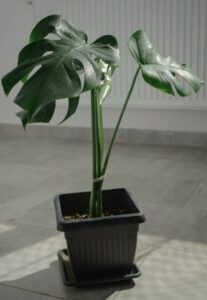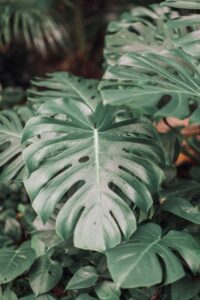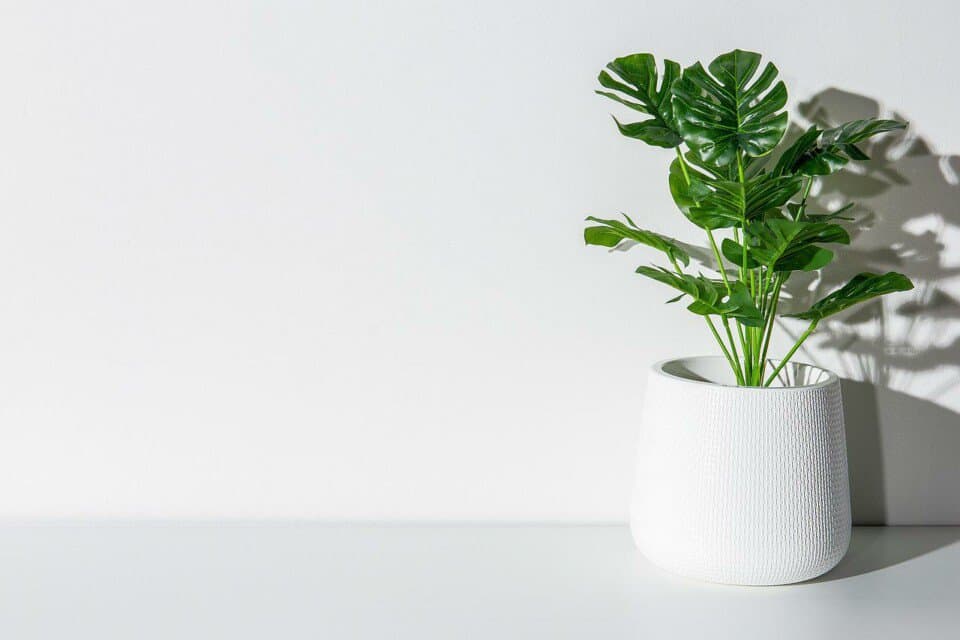Some links in the post are affiliate links and I get a commission from purchases made through some links found in the post.
Fertilizers are crucial for the growth of any monstera plant as they provide the nutrients required for this process. Improving the fertility of your monstera soil is just like taking supplements to add more nutritional value to what you consume.
The best fertilizer for your monstera plant is one that contains the basic mineral contents which are nitrogen, phosphorus, and potassium.
These mineral contents are important for the overall health of your plant as well as a healthy formation of roots.
There are a lot of fertilizers in the market that contains these necessary minerals, but we have recommended some of the best products for your monstera as well as some information on when and how to apply this fertilizer.
Keep reading to keep your monstera healthy using a fertilizer.
When Should I Fertilize my Monstera?
 The major growth of a monstera plant takes place during summer and spring, this period is the best time to apply fertilizer to your monstera plant.
The major growth of a monstera plant takes place during summer and spring, this period is the best time to apply fertilizer to your monstera plant.
This plant uses up the naturally occurring nutrients in the soil at this time so these nutrients need to be replenished.
If your monstera usually grows using indirect light from the sun, you will see a drop in performance during winter and you should not fertilize your plant at this time until spring.
If your monstera plant grows with artificial lighting then you can apply the normal amount of fertilizer needed.
How to Tell if your Monstera Needs Fertilizer
Fertilizers are essential to provide absent nutrients to your monstera plant. These nutrients are important for the growth of your monstera as well as its good health.
However, when these elements are lacking, your monstera plant will start to exhibit some of these symptoms.
- Stunted growth
- Discoloration of leaves
- Cracking leaves
What Type of Fertilizer Should you Give your Monstera?
As said earlier, the best type of fertilizer for your monstera plant is one that supplies adequate nitrogen, phosphorus, and potassium to your plant.
Nitrogen is important for the growth of your plant, phosphorus is important for producing and synthesizing energy, and potassium is important for photosynthesis.
These nutrients can be found in both organic and inorganic fertilizers.
There are two types of fertilizers; organic and inorganic fertilizers.
Organic fertilizers are made from decaying plant and animal matter, this type of fertilizer can be beneficial because it improves the soil structure and nutrient content, they are environmentally friendly, and they do not contain harmful chemicals that may affect your monstera.
Inorganic fertilizers are also known as synthetic fertilizers and they are made of minerals and artificial chemicals.
Inorganic fertilizers are known for having a faster effect on your plant growth and they are convenient to use. It is also affordable and accessible as it can be found in stores close to you.
The downside of using organic fertilizers is that it can take some time to act on your plant and can sometimes be ineffective as their effect is determined by a lot of factors.
And as for inorganic fertilizers, they are not very environmentally friendly and will not sustain the microorganisms in your soil. Inappropriate use of inorganic fertilizer can change the pH of the soil.
If you can’t decide between organic and inorganic fertilizer, you can consider your needs and determine which type of fertilizer meets them.
You can choose an organic fertilizer in the following conditions
- If you prefer a mild source of nutrient
- If you are concerned about the effect of fertilizer on your monstera roots
- If you want to continue microbial activity in your soil
Synthetic fertilizers can be helpful to you if:
- You desire immediate growth of your monstera plant. This is because synthetic fertilizers tend to be stronger than their counterpart
- You are using a medium with little nutrient
How Much Fertilizer Should you Give your Monstera?
 The amount of fertilizer you apply to your monstera plant depends on the strength of the fertilizer being used.
The amount of fertilizer you apply to your monstera plant depends on the strength of the fertilizer being used.
If you have a fertilizer with mild strength (a liquid fertilizer) can be used at a considerable amount and can be applied after every watering.
However, when using a strong fertilizer, you will need to apply a small amount and in some cases, these fertilizers will need to be diluted.
Specific measurements are usually applied to inorganic fertilizers, but if you have chosen to use organic fertilizer or compost, you can just apply a handful of this to your pot.
Strong fertilizers should be applied to the soil every few weeks. If your monstera plant is grown on a medium that is not soil (a rock-based medium) you will need a stronger fertilizer to compensate for the absent nutrient and this fertilizer needs to be applied every day.
Recommended Fertilizers for Monstera Plant
A good fertilizer should contain nitrogen (N), phosphorus (P), and potassium (K) in a ratio of 20:20:20 or 10:10:10.
This means that each mineral should have a percentage ratio of 20% or 10% in the fertilizer, the other percentages will be taken up by other nutrients like sulfur, zinc, boron, and magnesium.
However, some fertilizers may not have a balanced composition of these minerals as they have a composition of 3-1-2, but they work as well as the balanced ones. Below are some of the best fertilizers you can use for your monstera plant.
Inorganic fertilizers
1) Jack’s classic all-purpose fertilizer
This inorganic fertilizer contains a balanced ratio of NPK (20-20-20) as well as some other minerals like boron, copper, iron, manganese, and zinc that will aid the growth of your monstera.
If you want a powdered fertilizer then you should consider this product, you will need ½ teaspoon of this formula mixed with a gallon of water that will be used to water your indoor plant daily.
2) Miracle-Gro indoor plant food
This liquid fertilizer is great for the growth of indoor plants like monstera. It comes in portable packaging and a single pump of this solution is enough for a small pot, and two for a bigger pot.
Another plus is that it is affordable and available in most local retail stores, you can also mix this fertilizer with water for growth, the instructions recommend a mixture of four pumps per quart of water.
This mixture should be used to water your soil.
3) Osmocote smart release plant food
This product contains a balanced percentage of NPK (20-20-20) which supplies the necessary macro and micronutrients to your monstera.
This fertilizer has a granular texture coated with resin to gradually release the nutrients when watered.
To use this, apply two spoonfuls of these granules to four square feet of soil and then mix with the topsoil. You can proceed to water your monstera after the previous step.
Organic fertilizers
4) Houseplant resource indoor plant food
This is a strong liquid fertilizer suitable for your monstera plant. It contains NPK in a ratio of 3-1-2, when used at the right amount, this fertilizer won’t burn the roots of your plant as it is organic and contains no harmful chemicals.
It is also great for weak monsteras suffering from dehydration and low nutrients.
5) Liqui-Dirt Nano powder all-purpose plant food
This organic fertilizer has a look similar to dirt, this is because it is made of natural elements like poultry litter, cricket fras, humic shale, gypsum, rabbit manure, and others.
These elements help microbial action and also help to maintain the pH of the soil. To use this product, add some water to the fertilizer and use the cap provided to measure one cup to a gallon of water.
Use this water to water your monstera plant for maximum results.
6) Worm casting organic fertilizers
Like most organic fertilizers, this product improves soil structure, is non-toxic, and it is great for plant growth.
Worm casting is made from earthworms to improve aeration and the action of micro-bacteria in the soil, it also has a high content of water-soluble nutrients which is great for your monstera plant to absorb.
How to Make a Homemade Fertilizer for Your Monstera
Homemade recipes are always economical and effective and you can indeed make your fertilizer at home. It may surprise you that there are several recipes for fertilizing your indoor plant.
Using Green Tea to Fertilize your Monstera
Green tea is known to have a lot of health benefits and this may be because it contains important nutrients like potassium, phosphorus, calcium, and magnesium.
It also supplies other minor minerals like manganese, zinc, and copper. Another benefit is that you get to utilize your used green tea bags, you can do so using the methods below.
Method one: After using your green tea bags for recreational purposes, save the used bags and allow them to cool.
Open the tea bag when cooled and spread the leaves on your monstera soil just like mulch, water your soil after applying the leaves.
Method two: You can brew your tea bags in hot water for about ten minutes. Remove the tea bags and allow the tea to cool down before applying it to the soil of your monstera plant as a liquid fertilizer.
Using Aquarium Water to Fertilize your Monstera
Aquarium water equals fish waste and food leftovers. These elements contain nutrients that are helpful to the soil of most indoor plants like monstera.
This is another way to grow your plant economically as you can easily apply this water when changing the aquarium water.
Using Epsom Salt to Fertilize your Monstera

Epsom salt is a rock salt rich in minerals like magnesium, calcium, and sulfur.
Epsom salt can be used for several purposes involving health, homecare, and of course fertilizing your monstera plant.
Dissolve a teaspoon of Epsom salt into one quart of water and use this to water your plant, be careful not to use a lot of this salt as it can harm your monstera plant.
Is Banana Water Good for your Monstera?
Banana water is good for your monstera as it can be used as a liquid fertilizer.
Banana peel contains minerals like magnesium, potassium, and vitamins, all these nutrients will be a helpful resource for your monstera to utilize.
Soaking these peels in water for a few hours will allow these nutrients to dissolve into the liquid which can be used later to water your monstera.
Is Rice Water Good for Monstera?
Rice water is good for your monstera plant but only in terms of supplying micro-nutrients. This liquid does not contain any significant mineral and should only be used when your monstera soil lacks minor nutrients.
Are Eggshells Good for Monstera?
Eggshells are indeed good for your monstera plant and are another way to fertilize your plant on a budget.
This food item is rich in minerals like calcium, phosphorus, and magnesium, to utilize it you need to peel off the inner membrane and then allow the shells to dry under the sun.
When dried, grind the shells and soak in water for some hours to make liquid fertilizer, this liquid should be used to water your monstera plant.
Are Coffee Grounds Good for Monstera?
Coffee lovers may be excited to share their favorite beverage with their favorite plant, but unfortunately, coffee grounds are not good for your monstera plant.
This is because coffee grounds are very acidic and unsuitable for your indoor plant as they may inhibit its growth. A monstera plant thrives on soil with a pH level between 6 and 7.
Over-Fertilizing your Monstera Plant
Over-fertilizing your monstera plant can lead to a fertilizer burn. This burn occurs as a result of root damage and it can lead to the leaves of your monstera wilting.
Some common signs of this problem include a visible white crust at the topsoil, stunted growth, and the edges of your leaves turning yellow.
The easiest and best way to solve this problem is to flush out the excess fertilizer out of the soil by watering and allowing it to drain at the bottom.
To avoid overwatering, allow the soil to dry before the next flush, at this period suspend the application o fertilizer.
You may also like: How to care for a monstera
When Should you not Fertilize Monstera?
Just there is a right time and condition to fertilize your monstera plant, there is also a wrong time to carry out this task.
Do not fertilize our monstera plant if the soil mix used to grow this plant already contains fertilizer, doing this will only lead to the excess application of fertilizer which is not good for your monstera.
It is also not recommended not to fertilize your monstera during winter if it doesn’t use a grow light.
Final Thoughts
 We have explained the best fertilizer for your monstera plant as well as other requirements for providing nutrients for the soil.
We have explained the best fertilizer for your monstera plant as well as other requirements for providing nutrients for the soil.
You can take a pick from our recommended products that contain both organic and inorganic fertilizers, be sure to fertilize your monstera plant at the right time and avoid application in excess.








